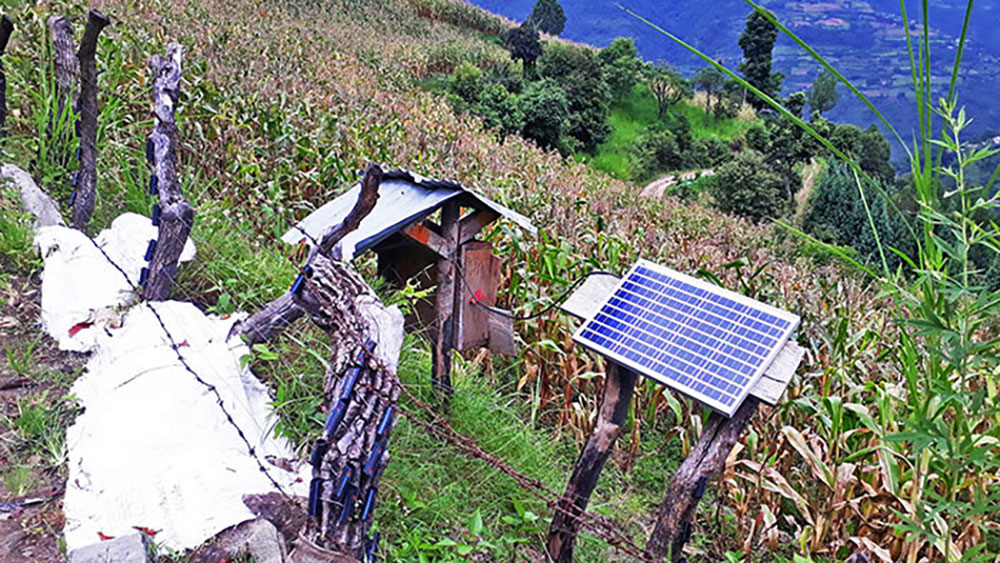Recently two elderly farmers died of electrocution in Yangner gewog
Neten Dorji
Trashigang – In a disturbing trend, the use of illegal electric fencing across farms in Trashigang has been increasing, posing considerable risks to human lives.
Despite stringent penalties, farmers continue to use live electric wires to protect their crops from wild animals. And in some unfortunate incidents, it has had deadly consequences.
Farmers use makeshift electric fences, secretly operating at night and removing them by dawn. This dangerous tactic has claimed lives, with the recent electrocution deaths of two elderly farmers in Yangner gewog in Trashigang.
Local leaders revealed that many farmers directly connect electric wires from metre boxes or bulbs to create high-voltage fences, circumventing the approved and safer solar-powered alternatives provided by the government.
“Despite the risks, villagers prefer the live wires because they are more effective than solar fencing,” a tshogpa said. “It’s high time that the authorities addressed the issue of human-wildlife conflict.”
Tashi Phuntsho, a farmer from Radhi, said that the government-issued solar fencing failed to keep the wild animals at bay. “The low voltage and inconsistent power supply fail to provide sufficient shock to wild animals,” he said.
Tenzin, 67, from Shongphu gewog, shared similar frustrations. “While solar fencing has reduced wildlife damage compared to previous years, the voltage of solar-powered fences is insufficient. Farmers then connect the electric fence to a regular power supply,” he said.
Another farmer said that the voltage from legal electric fences is sometimes so low that it fails to deliver any shock. “Occasionally, the fence has no current at all,” she said.
Local government administrations face difficulties addressing this issue, as the illegal fences are often concealed and unreported.
“When deaths occur due to electrocution, the causes are often hidden. Farmers use these illegal fences covertly, especially as traditional methods like burning fires and shouting are no longer effective,” a gup said.
The Bhutan Power Corporation (BPC) has issued warnings regarding the misuse of electricity, particularly highlighting the dangers associated with illegal electric fencing. “This poses significant risks to both human lives and wildlife. Electric fences, when used improperly, can cause severe harm, leading to injury or even fatalities,” states the BPC notification.
BPC officials in Trashigang said that, as long as villagers used an energiser, a device to control the electricity voltage, an electric fence wouldn’t be considered illegal.
“We are inspecting the use of live wire without energiser, and at the same time, we are also creating public awareness about electrical safety,” a BPC official said. “So far we have completed awareness programmes in three gewogs.”
However, BPC officials are not able to detect illegal fences as they are often hidden.
Yangner Mangmi Yeshey Lhamo said that most farmers prefer chain-link fencing to electric fencing. “We cannot provide chain link fencing due to budget constraints,” she said.
Radhi Gup Yonten Phuntsho said that constructing walls and installing solar fencing might offer a more effective and cost-efficient solution compared to chain-link fencing. “Building a wall a few meters high combined with solar fencing could be a viable alternative,” he said.
Some local leaders said that compared to the past, the illegal use of electricity has reduced after the introduction of solar fencing.
Although solar fencing has been introduced as a solution, the frequency and severity of human-wildlife conflicts have intensified in recent years. Farmers report significant economic losses from livestock attacks and crop damage, and often they do not receive any compensation.
Residents living on the fringes of forested areas experience the brunt of these conflicts, with wild animals frequently raiding their farms.


